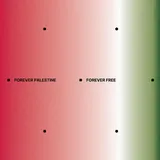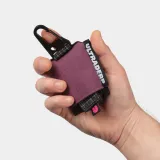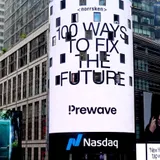
Mucho on My Life In Design podcast
From May 8th to 10th, 2025, Mucho attended OFFF, Barcelona’s premier design festival — and if it has quietly slipped under your creative radar, now is the time to tune in. In this article, we are sharing some highlights from the live recording of the My Life In Design podcast, hosting Mucho´s co-founder and Creative Director; Marc Català on May 8, live at one of OFFFests´s stages.
In this special episode recorded in front of a live audience, one of our partners at Mucho; Marc Català, joined Claire Blyth; Managing Partner at Red Setter agency and host of the My Life In Design podcast for an engaging conversation full of insight, humour, and real-world experience from the creative industry. Marc shared the story behind the founding of Mucho, charting its growth from humble beginnings to a global design agency with studios in Barcelona, San Francisco, and Melbourne, and a collective of 11 partners leading its evolution.
“I think one of my earliest memories is my mother taking me to exhibitions and I really didn’t want to go. I really didn’t…and it’s funny because now I’m doing the same thing to my kids.”

Pre‑Mucho Era: the humble beginnings
Bitten early by the creative bug, Marc’s path into design felt like second nature, and almost inevitable. It all began in art galleries he didn’t want to visit, leading to enrolling in a design and arts school, to landing his first job at Grafica studio alongside well-known Spanish designers, and eventually working for the redesign of El País, a prestigious national newspaper, alongside his friend and co-founder of Mucho; Pablo Juncadella — a job considered “super high-end for the nineties”. Marc recalls the intense days and nights living and breathing design, yet within the four walls of an apartment in one of Madrid’s tallest skyscrapers. As Marc jokingly recalls: “this was both cool, but borderline slavery.”
From their sky-high creative bunker in Madrid, sketching obsessively with his work partner; Pablo, to collaborating with talented designers, and later joining the iconic design studio; working for leading names in the editorial world such as the Pentagram, The Observer in London — Marc’s early career was nothing short of extraordinary — defined by intensity, fearless experimentation, and an unwavering dedication to craft, while juggling between London and Barcelona on a weekly basis, earning him enough AirMiles, to make even a travel blogger jealous.
The Birth of Mucho: early days
The longing to return home to Barcelona planted the first seeds of what would become Mucho—Marc’s next chapter as early as in his mid-20s. The studio was born, quite literally, around Pablo’s kitchen table. The hardest part? Not the work itself, but picking a name. Among the early (and questionable) contenders: Ping Pong.
As fresh-faced founders in a world of heavyweight studios, they were well aware of their underdog status — “kittens among lions.” They said yes to everything, took on whatever came their way, and charged next to nothing just to stay in the game. It was scrappy, chaotic, and driven by a deep desire to learn. There was constant uncertainty — ”Am I going to make it? ”— but eventually, you stop overthinking and just take the leap. That’s how Mucho began: with risk, restlessness, and a belief in something bigger than themselves.
“When you do it, it´s like there’s this constant worry about, “Am I going to make it? Am I going to get the money?“ It comes to a point where you just close your eyes and do it. It´s a leap of faith.“
The Birth of Mucho: first clients
The very first clients were landed through local connections and family ties. One of the most unforgettable clients, Marc recalls, were the Chocoa brothers — a family-run business led by two wildly creative brothers, mixing innovation with the art of chocolate making, varying anything from spices to anchovies. Marc alongside his partner Pablo were able to match their energy with a playful, experimental approach, designing 20 unique wrappers every two weeks — chaotic, intense, and completely original.
Ultimately, these early, medium-sized projects shaped their philosophy that good design comes from listening closely, embracing the unexpected, and catering to each client’s unique vision.
“Disagreements are a really good thing. They are a bad thing if they turn into rows or arguments, but know that you can agree to disagree.“
The Birth of Mucho: from ambition to expansion
Mucho began as a small, ambitious studio of just a few people. From the start, Marc and Pablo viewed it as a collective — not about themselves, but about something bigger. As their ambition grew, they realized they couldn’t scale alone.
Bringing Tilman Solé into the picture — now one of Mucho’s partners in Barcelona — marked a key turning point in the studio’s evolution. Tilman´s arrival brought a sharper focus on strategy and helped elevate Mucho to the next level. It became clear that creative talent alone wasn’t enough; strategy had to take a leading role in shaping the studio’s direction.
Later, reconnecting with friends from Pentagram in Lodnon helped broaden their vision — but most notably, joining creative forces with Rob Duncan, now Mucho’s partner in the San Francisco office, became a pivotal moment in their expansion as well. Today, Mucho proudly operates as a global collective of eleven partners, rooted in collaboration and bold ideas.

“My advice to junior designers is that the best thing you can do is only focus on what you can control. A lot of time, my focus was on things I couldn´t control, but that stressed me. Just work hard on what you can control.“
The Design Mindset: the architects of Culture
At Mucho, design is viewed not just as an output, but it is viewed in a holistic way, as a way of thinking — a mindset that extends into leadership, culture, and growth. Rather than separating creative work from management, the team sees both as part of the same design process: shaping environments where people thrive, ideas evolve, and talent is nurtured. This holistic approach reflects a deeper belief that good design doesn’t stop at the deliverable — it is embedded in how teams are built, challenges are reframed, and futures are imagined.
Listen to this episode of My Life In Design podcast, now available on your favourite podcast platforms.


